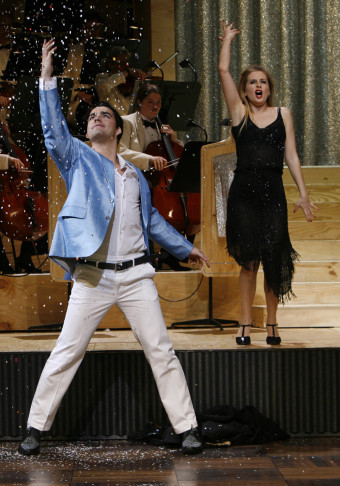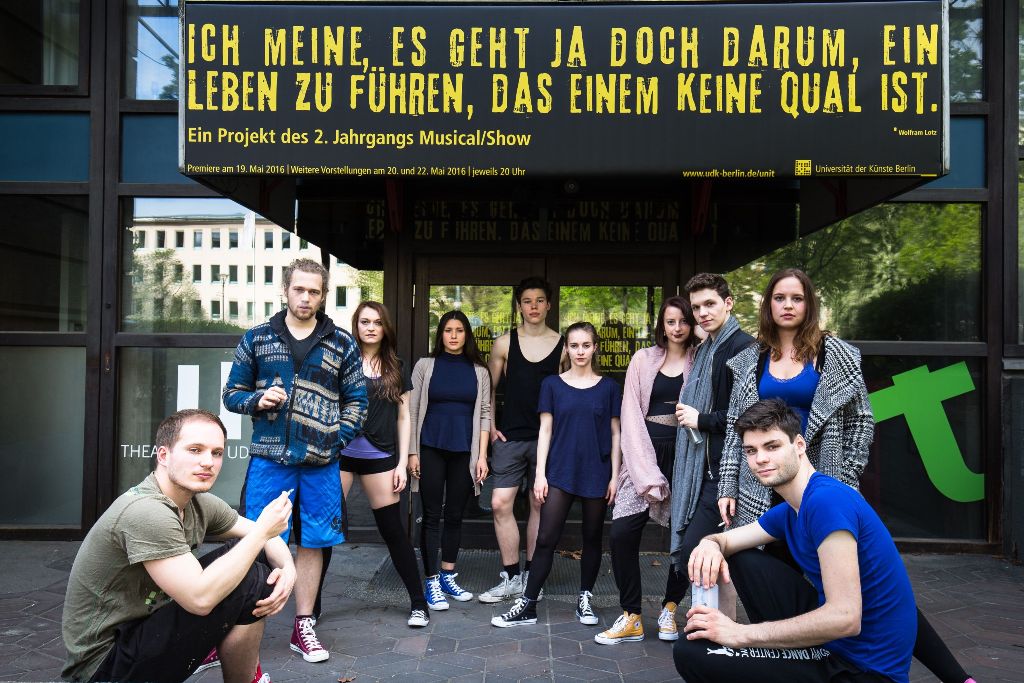Kevin Clarke
Operetta Research Center
21 May, 2016
It is always refreshing to see new and awe-inspiring talent. The so called “collages” at the Universität der Künste (UdK) in Berlin are the perfect opportunity for that. Every two years the new musical theater students/Studiengang Musical present themselves with a “pasticcio” (= collage) which introduces them to the world at large at the UNI.T theater in Fasanenstraße: ten young singers and dancers who hope to be tomorrow’s stars. In many cases, the young UdK performers have actually made this dream come true, and in many cases they have turned out to be amazing operetta performers, too. The most famous example is probably Nicky Wuchinger who went straight from the UdK to Bremen to star in Vetter aus Dingsda (directed by Frank Hilbrich), then to the Theatermuseum Wien, where he sang at the opening of the exhibition Welt der Operette, and then onto Phantom of the Opera in Hamburg, playing first Raoul and then the title role.

Nicky Wuchinger in “Der Vetter aus Dingsda”. (Photo: Theater Bremen)
The 2016 group presented a show entitled Ich meine, es geht ja doch darum, ein Leben zu führen, das einem keine Qual ist. Got it? It roughly translates as “It’s all about leading a life that isn’t a drag, right?” This existentialist title can be seen as homage by director Mathias Noak to the 2014 collage, directed by Rhys Martin, who now functions as co-director. The last collage had a similar title, it was similarly constructed, and it was similarly directed: an empty black stage on which young singers talk about some of the central questions of modern life, such as identity, sex, social media, love, relationships, loneliness, politics, immigrants, family, and self. While I found the “Ich-Konstruktionen” – constructions of self – in the last show riveting, they somewhat lost their effect by being so obviously recycled. It’s a bit like watching Starlight Express after having seen Cats.
But it works, for Lloyd Webber as well as for the UdK. The ten performers are delivering impressive ensemble work and scenes that can really make your heart miss a beat.
One such scene, in the new show, was a love scene between Adrian Burri (the group’s butch hunk) and Helge Lodder (the groups ‘baby’ boy). There have always been LGBT scenes in previous shows, but here the LGBT moment was about love between brothers. Yet, this incest moment did not feel like it was about creating scandal or shock, but it wanted to confuse the viewer by showing something forbidden, but still incredibly touching. At least I was touched. Turning left and right, I only saw people watching in stunned silence. You could hear a pin drop when Burri and Lodder undressed and kissed. Their vulnerability was striking, and the staging managed to be painfully intimate, yet never pornographic or embarrassing for the performers.

The UdK production “Ich meine, es geht ja doch darum, ein Leben zu führen, das einem keine Qual ist”, Berlin 2016. Adrian Burri is on the far left, Helge Lodder is fourth from left. (Photo: Daniel Nartschick/UdK)
I can’t tell where this brotherly love scene originally comes from. The program does not list any songs, nor shows where the individual pasticcio parts are snatched from. Which is sad, because it makes writing about Ich meine, es geht ja doch darum, ein Leben zu führen, das einem keine Qual ist very difficult.
Talking of the songs. As dazzling as the construction of the show was, as amazing as many of the individual performances were (special mention should go to Markus Fetter for his solo “Männer ABC” in which he narrates – in pink drag – that he only kisses his male lovers in alphabetical order; it’s a show stopping song by Pigor and Eichhorn): the overall musical selection was not particularly thrilling. Pianist and musical director Adam Benzwi made sure there were many stupendous cabaret songs and chansons throughout the evening. You could tell from the delivery of these musical gems that Benzwi had worked hard with his students. These were, all the way, performances of a maturity and textual detail rarely encountered in singers in their early 20s. They are also song selections ideally suited for the next Bundeswettbewerb Gesang competition, chanson category. But where were the big hits that allow you, as an audience, to compare and evaluate?
There was only one truly famous number, “Movie in My Mind” from Miss Saigon. And Lisa Toh performed it in a definitive version – while committing suicide. But that was more or less it, in terms of “standards.” (I hope I am not mixing up the performer’s names here.) When you google some of the singers, for example Adrian Burri, you find video clips of him singing Chicago and Chess, both proving that he is a pretty amazing vocalist. His vocal solos in Ich meine, es geht ja doch darum, ein Leben zu führen, das einem keine Qual ist, by contrast, were mostly unimpressive, not showing off his vocal abilities to any advantage. The same might be said for most of the other singers. Which is a shame.

The ten young UdK students in front of the UNI.T in Berlin, where they perform “ch meine, es geht ja doch darum, ein Leben zu führen, das einem keine Qual ist.” (Photo: Daniel Nartschick/UdK)
In terms of future careers, it is interesting to see that these ten students are not all the super trained super bodies of the “tits and ass” variety, parodied in A Chorus Line and mostly seen on Broadway these days. Instead, many of them could develop into character actors and unique non-normative stage presences. One such performer was the petite Friederike Kury.
And Lisa Hörl as a red devil delivered a kind of mad-cap operetta moment – with a grand coloratura finish – that made you long for more.
The show will be performed only three times. The next performance is on Sunday. They had to skip Saturday night because Adam Benzwi is in Wiesbaden performing Oscar Straus’ Eine Frau, die weiß was sie will with Dagmar Manzel and Max Hopp.
The story telling in Ich meine, es geht ja doch darum, ein Leben zu führen, das einem keine Qual ist is fluid and brilliant, the construction of the play as well. And the staging by Mathias Noak and Rhys Martin (sets and costumes by Sonja Kloevekorn) is a model of witty up-to-date stage craft that many so called established opera and operetta directors could learn from. (There was also great video work by Vincent Stefan.)
You can see all the performers at the end of the year in their Neuköllner Oper show, written especially for them by Peter Lund. (Who is currently in Vienna directing Benatzky’s Axel an der Himmselstür an der Volksoper.) Let’s hope there will be more grand singing in that next show, and also in the next collage. As an overall first impression this is still a masterful achievement by ten young performers that should be welcomed by the operetta world with open arms – because you are not likely to find this amount of youthful energy and talent in traditional operetta ensembles.
The Ohio Light Opera, among others, or the Victor Herbert Renaissance Project Live!, could both use such talent well to spice up their future programs.
And I look forward to seeing if anyone of the ten singers – Adrian Burri, Jasmin Eberl, Markus Fetter, Jonathan Francke, Linda Hartmann, Lisa Hörl, Friederike Kury, Helge Lodder, Lisa Toh, Nico Went – will turn out to be another Nicky Wuchinger conquering operetta land before moving onto Broadway or Stage Entertainment. Stage director Frank Hilbrich, who cast Nicky in Vetter in Bremen, sat next to me during Friday night’s performance and took mental notes of these new stars.
For more information, click here.
